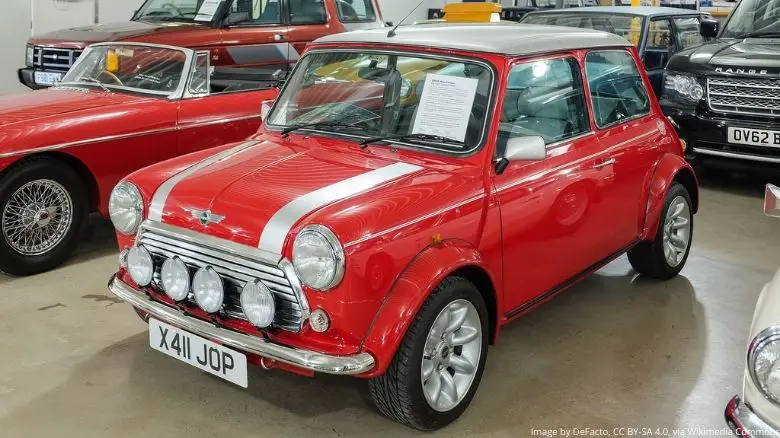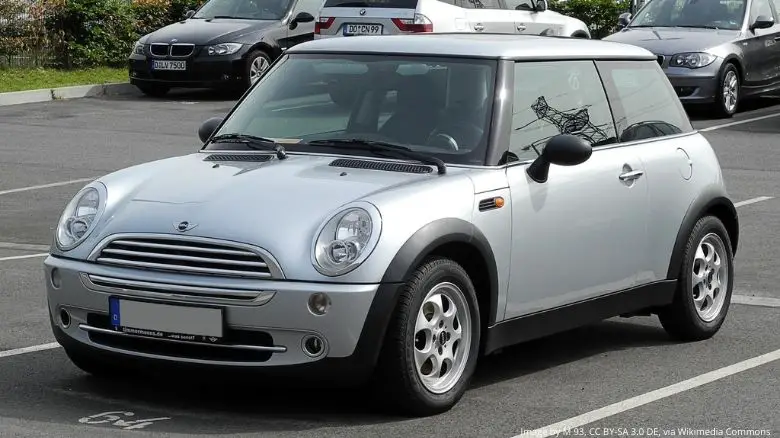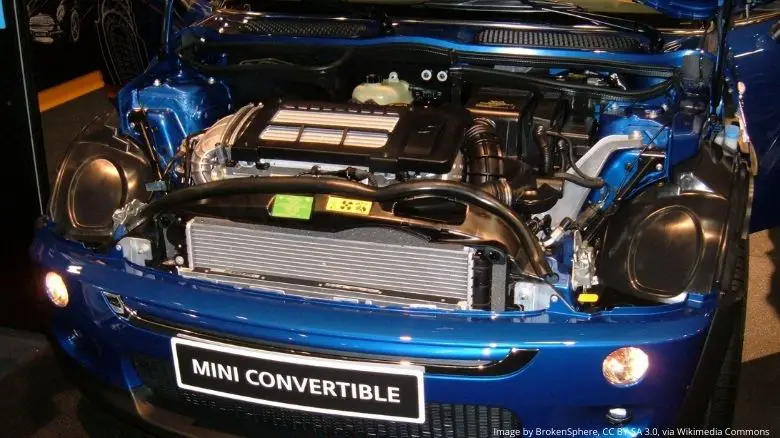Does BMW Own MINI? (And Who Owned MINI Before BMW?)

Adam
Founder, The Car Investor
The first Minis hit the roads in 1959 and were built by The British Motor Corporation. The compact cars took the UK by storm, and throughout the 1960s the brand had become so popular that the original two-door Mini soon became a cultural icon of Great Britain.
By 1969 ‘MINI’ had become a brand in its own right.
Until the latter part of the 1990s the classic MINI design remained relatively unchanged and was under the control of Rover Group, but rumours started to emerge regarding BMW’s interest in buying the brand.
So what happened next? Does BMW own MINI?
The BMW Group owns the MINI brand and has done since it purchased it in 1994. MINI was included as part of BMW’s acquisition of the Rover Group, the brand’s previous owner.
BMW’s purchase and subsequent modernisation of the MINI brand has been well-documented, but when was the BMW MINI launched, and do MINIs have BMW engines?
Who owned MINI Cooper before BMW?
The Rover Group conglomerate, previously known as British Leyland, owned MINI before BMW purchased the company in the 1990s.
When looking into the history of the MINI brand, it may appear to have changed hands a number of times since its inception. However, the truth is that its parent company evolved several times over the decades.

A pre-BMW ‘classic’ Mini Cooper
Here’s how MINI’s ownership history looks up until the BMW era:
1959 – the ‘Mini’ was introduced as a model of car under the Austin and Morris brands, rather than its own brand. It was produced by The British Motor Corporation (BMC)
1966 – BMC becomes part of British Motor Holdings
1968 – British Motor Holdings is merged with Leyland Motors to become British Leyland
1969 – ‘MINI’ becomes a brand of its own, still owned by British Leyland
1986 – British Leyland is broken up and the MINI brand is acquired by the Rover Group
1988 – The Rover Group is bought by British Aerospace
1994 – BMW buys the Rover Group from British Aerospace, but production of the classic style MINI continues until 2000
2001 – BMW brings out its first modern MINI
As confusing as MINI’s previous ownership may seem, it essentially boils down to being owned by one company that was known as British Leyland for the majority of the original MINI’s reign.
It was responsible for popularizing the MINI and, through its various reorganizaitons and takeovers, was been responsible for MINI’s evolution and continuous production up until the turn of the millennium.
When was the BMW MINI launched?
Advertisement
The first BMW MINI was launched in July 2001 after the previous generation had ceased production a year earlier.
The BMW MINI started its journey at the beginning of the new millennium, and has been going from strength to strength ever since.

The first generation BMW MINI (R50)
With BMW purchasing the rights to MINI, many began to wonder what would happen to the popular brand that they had known and loved for many years. Thankfully, BMW made significant investments to ensure that MINI cars continued to be produced in the UK, at its plant in Oxford.
What was once one of the most recognizable cars on the UK’s roads quickly became one of the most recognizable around the world thanks to BMW’s investment.
And it’s not only the MINI Cooper, as the MINI brand now has a larger selection of models than ever before – including the MINI Convertible and MINI Clubman.
Do MINI Coopers have BMW parts?
MINI Coopers utilize parts that are developed by BMW, meaning MINIs can be worked on by trained BMW technicians.
Whilst MINI remains a separate brand to BMW, it is still under the umbrella of the BMW Group. For that reason, many of the parts used are developed and built by BMW. Some are even shared across models that are made by the group.
MINI Coopers, as well as other models in the MINI range, are considered some of the best handling cars on the road. In part, this is due to the superior quality and performance of the BMW parts being used.
Do MINI Coopers have BMW engines?
Advertisement
Modern MINI Coopers are fitted with engines developed by BMW. Previous generation MINIs were fitted with engines developed by BMW in collaboration with Peugeot (2007-2015) and Chrysler (2001-2008).
Since the BMW MINI was launched in 2001, BMW has worked with a handful of other car manufacturers to develop engines for its platform.
The first generation BMW MINI (R50 / R52 / R53) was fitted with a Tritec engine. Tritec was a company established in 1997 as a joint venture between Chrysler Corporation and the Rover Group (under BMW ownership). Tritec engines were built in Brazil before being fitted to MINIs at the company’s UK plant.

2005 MINI with a Tritec engine
The diesel variant of the same era was fitted with an engine developed by Toyota.
When the second generation BMW MINI (R56 / R57) was launched in 2007, BMW had teamed up with PSA Peugeot Citroen to produce the ‘Prince’ engine; a range of 1.4l and 1.6l petrol engines.
Unfortunately these engines were plagued with reliability issues, and a number of recalls were issued to fix severe problems that commonly arose.
From 2015 onwards, BMW developed engines for the MINI range that were shared with other models in the BMW range.
To recap:
1st gen BMW MINI: Tritec developed by Rover Group (owned by BMW) & Chrysler
2nd gen BMW MINI: Prince developed by BMW & Peugeot
3rd Gen BMW MINI onwards: developed by BMW
How many BMW MINIs have been built?
Over 5 million BMW MINIs have been built since the German company modernized the MINI brand in 2001.
When BMW took the reins, sales of new MINIs exploded as the brand became relevant once more.
Dwindling sales in the 1990s meant something had to be done to revolutionize the iconic brand, and production numbers show that BMW certainly pulled it off.
In recent years, MINI’s popularity has rocketed even further, and BMW is now producing over 350,000 units per year of the influential car.
BMW spotted an opportunity with the British brand back in the ’90s, and the MINI Cooper in particular is now one of the most popular hatchbacks on the roads in the UK, Europe, America and beyond.
In 2019 the company celebrated a significant milestone as the 10 millionth MINI rolled off the production line, including the 5.3 million classic MINIs that were produced between 1959 and 2000 before BMW took charge.
Final thoughts
Advertisement
BMW’s takeover of the British marque had many classic Mini enthusiasts worried, as they were concerned that the Bavarian-based manufacturer would ruin the legacy of an icon.
Instead, the modern Mini is a huge success story, and the redesign and modernization has breathed new life into the MINI brand.
Without BMW’s intervention, Minis may well be a distant memory for many, and the potential for a MINI Cooper suitable for modern motoring may never have been realized.
No spam. We'll only email you when it matters.

About the Author
Adam is the founder of The Car Investor, combining his passion for classic cars with data-driven investment strategies to help collectors maximize their returns.
View all articles →Related Articles

How to Learn to Work on Cars: 8 Simple Steps
Plenty of people dream of being able to fix their own car. There’s something about the inner-workings of a vehicle that just fascinates people. Learning to work on your own car can be a great way to save money, and it can also be a fun hobby.

Is Driving Fast Bad For Your Car?
Driving fast is bad for the engine, drivetrain, suspension and various other components of a car as it causes them to wear more quickly. However, modern cars are built to tolerate speeds much higher than are legal on any public road.

Are Jaguars Good Cars? (And Are They Worth The Money?)
Jaguars are some of the most exceptional high-quality cars around. Their reputation for reliability is improving, their looks are magnificent, and their performance is sublime. Jaguar has a long history of producing great cars, and is continuing to innovate as we move into the electric vehicle era.
Advertisement